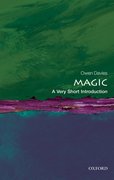Magic in the modern world
The recent battle between religion and science conducted in the media, spearheaded by Professor Richard Dawkins and other high-profile figures, has garnered much international attention. The debate is not new of course; it stretches back several centuries. One aspect of the debate that receives less attention today is the issue of magic: a concept which is inextricably linked to the history of science and religion. The notion of both science and religion as magic is as relevant today as it ever was.
Magic: what’s in a word?
Magic continues to pervade popular imagination and language. Today the term ‘magic’ can be used to describe the supernatural, superstition, simple illusion, religious miracles, and fantasies of the imagination. It can also be applied to the ‘wonders’ of science, or used as a simple superlative. The literary confection known as ‘magical realism’ has considerable appeal, as demonstrated by the success of Life of Pi. Modern scientists have even incorporated the word into their vocabulary, with their ‘magic acid’ (a super acid developed in the 1960s) and ‘magic angles’ (an angle of 54.7356°) .
Magic and primitivism
Since the Enlightenment – which the study of magic reveals as a problematic historical concept in itself – magic has often been seen as a marker of primitivism, of a benighted earlier stage of human development, and yet across the modern globalised world hundreds of millions continue to resort to magic and also to fear it. Magic provides explanations and remedies for those in extreme poverty and without access to alternatives. While in the industrial West, with its state welfare systems, religious fundamentalism decries the continued public threat posed by magic, and in our pluralistic spiritual democracy some have redefined magical practices as a form of religion.
Global magic
The debate over religion, magic, and science in the modern world is also too often conceived within a Judaeo-Christian western framework of intellectual development, with the magical and religious beliefs of much of the rest of the world ignored in general histories and debates. The magic of the literary cultures of China, India, and Asia are as rich and ancient as those of the Mediterranean world and are equally important to understanding what influenced developments in western magic. Understanding how different cultures have negotiated the relationship between science, religion and magic over the centuries and millennia also help us put Western developments in context. The influence of the Bible and Koran on magical traditions in Africa, the Americas and the Middle East are equally illuminating. The vast resource of oral traditions regarding magic, science, and religion in non-literary cultures also needs to be considered on an equal footing in our consideration of past and present human understanding. It is only by studying and comparing oral and literary magic cultures of the world that we can breakdown notions of primitiveness based on western assumptions.
Magic in your car
Twentieth-century technology is not immune from magical interference. Across the globe today talismans are placed in cars to protect them as much as the occupants. Ethnographers working in the bocage region of Normandy during the 1970s and 1980s found that car accidents or breakdowns were sometimes blamed on witchcraft. This notion is merely a technological version of the frequent accusations in earlier European sources that witches caused cart wheels to break or wagons to get stuck in the mud. In parts of Africa the introduction of tractors added a new dimension to agricultural witchcraft disputes. A study of road travel in Ghana found that the wrecks of cars and lorries at accident black spots on otherwise good, new road surfaces attracted suspicions of witchcraft.
Wishful thinking: magic?
We all have our magic moments. Have you ever urged your car to go faster as it struggles up a slope? Have you ever made a wish or believed that an event was more than coincidence? A desire for something to happen – ‘I hope she loses her job’ – may be expressed rationally, but if it comes true it may be interpreted magically. These are phenomena of our waking hours. In our dreams our minds lead us into magical worlds and activities. Far from espousing a rational view of the world, parents from cultures across the globe actively encourage magical thinking in pre-school children. It provides explanations to satisfy children in their early stages of inquisitiveness about why things work or happen. Children’s books feed magical fantasies, and early-years children’s television present magical worlds that bear no relationship to the real world. Why do we nourish magical thinking? It shields our ignorance, helps parents avoid uncomfortable questions, and provides a satisfying shared realm of adult and infant imagination and escapism.



Thank you Owen for this interesting article. I have always wondered me what the role of science is here. While it’s true there are things we cannot explain there’s always a reason behind everything that happens in our world.
What do you think of the law of cause and effect or action reaction? Can’t those explain the weird things or coincidences that happen in ur lives when we have that desired for something to happen?
Regards,